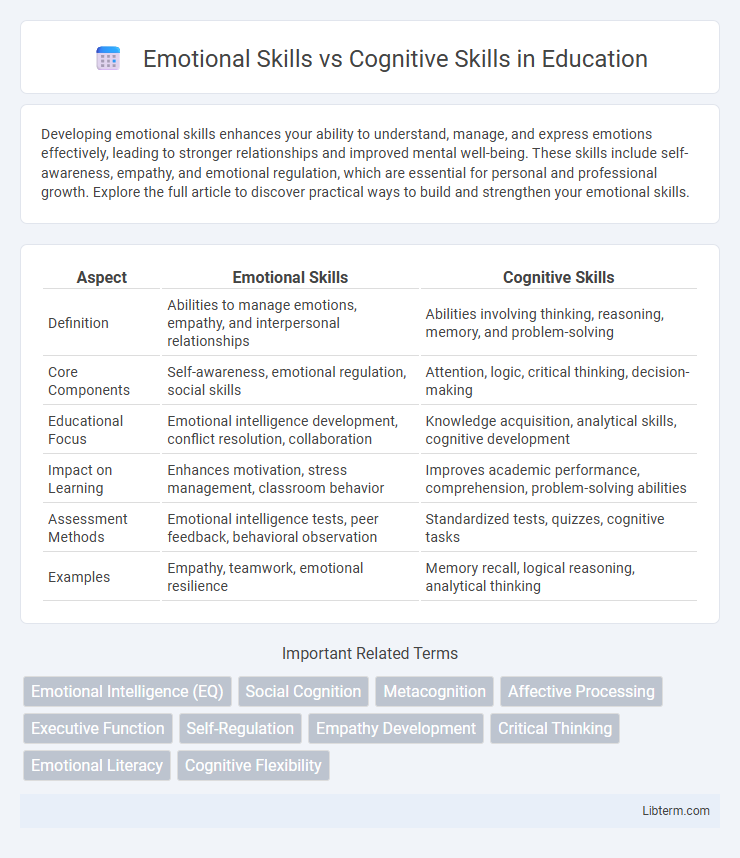Developing emotional skills enhances your ability to understand, manage, and express emotions effectively, leading to stronger relationships and improved mental well-being. These skills include self-awareness, empathy, and emotional regulation, which are essential for personal and professional growth. Explore the full article to discover practical ways to build and strengthen your emotional skills.
Table of Comparison
| Aspect | Emotional Skills | Cognitive Skills |
|---|---|---|
| Definition | Abilities to manage emotions, empathy, and interpersonal relationships | Abilities involving thinking, reasoning, memory, and problem-solving |
| Core Components | Self-awareness, emotional regulation, social skills | Attention, logic, critical thinking, decision-making |
| Educational Focus | Emotional intelligence development, conflict resolution, collaboration | Knowledge acquisition, analytical skills, cognitive development |
| Impact on Learning | Enhances motivation, stress management, classroom behavior | Improves academic performance, comprehension, problem-solving abilities |
| Assessment Methods | Emotional intelligence tests, peer feedback, behavioral observation | Standardized tests, quizzes, cognitive tasks |
| Examples | Empathy, teamwork, emotional resilience | Memory recall, logical reasoning, analytical thinking |
Introduction to Emotional and Cognitive Skills
Emotional skills involve the ability to recognize, understand, and manage emotions both in oneself and others, essential for effective communication and interpersonal relationships. Cognitive skills encompass mental processes such as attention, memory, reasoning, and problem-solving, critical for learning and decision-making. Mastering both emotional and cognitive skills enhances overall personal and professional development by fostering emotional intelligence and cognitive efficiency.
Defining Emotional Skills
Emotional skills encompass the ability to recognize, understand, and manage one's own emotions, as well as empathize and interact effectively with others. These skills include emotional regulation, empathy, social awareness, and interpersonal communication, which are essential for personal and professional success. Developing emotional skills enhances emotional intelligence, leading to improved relationships, decision-making, and stress management.
Understanding Cognitive Skills
Cognitive skills encompass essential mental capabilities such as attention, memory, reasoning, and problem-solving that enable individuals to process information effectively. These skills are foundational for learning, decision-making, and adapting to new situations, influencing academic achievement and professional success. Developing strong cognitive abilities enhances critical thinking and improves information retention, facilitating more efficient and accurate task completion.
Key Differences Between Emotional and Cognitive Skills
Emotional skills involve the ability to recognize, understand, and manage one's own emotions and empathize with others, crucial for social interactions and emotional regulation. Cognitive skills pertain to mental processes such as attention, memory, problem-solving, and logical reasoning, essential for learning and intellectual tasks. Key differences lie in emotional skills emphasizing interpersonal communication and self-awareness, while cognitive skills focus on information processing and analytical thinking.
The Role of Emotional Skills in Daily Life
Emotional skills, such as empathy, self-regulation, and social awareness, play a crucial role in managing interpersonal relationships and navigating social environments effectively. These skills enhance communication, conflict resolution, and emotional resilience, promoting overall mental well-being and productivity in daily activities. Unlike cognitive skills that involve problem-solving and logical reasoning, emotional skills directly influence how individuals perceive, express, and control their emotions in real-life situations.
The Impact of Cognitive Skills on Problem-Solving
Cognitive skills, including critical thinking, reasoning, and memory, directly influence problem-solving effectiveness by enabling individuals to analyze information, identify patterns, and generate solutions efficiently. Strong cognitive abilities support logical decision-making and creativity, which are essential for navigating complex challenges and adapting to new situations. Enhancing these skills through targeted practice can significantly improve one's capacity to solve problems accurately and swiftly.
Emotional Intelligence vs Cognitive Intelligence
Emotional Intelligence involves the ability to recognize, understand, and manage one's own emotions while effectively navigating interpersonal relationships, essential for empathy and social interaction. Cognitive Intelligence refers to analytical thinking, problem-solving abilities, and knowledge acquisition that drive intellectual pursuits and decision-making processes. Both skill sets contribute uniquely to personal and professional success, with emotional intelligence enhancing collaboration and cognitive intelligence supporting critical reasoning.
How Emotional and Cognitive Skills Develop
Emotional skills develop through social interactions, self-awareness, and emotional regulation experiences, primarily shaped in early childhood and refined over time through practice and feedback. Cognitive skills emerge from brain maturation, learning experiences, problem-solving, and memory exercises, with critical growth phases during childhood and adolescence. Both skill sets are interconnected, with emotional skills influencing motivation and cognitive performance, while cognitive abilities enhance emotional understanding and regulation.
Enhancing Both Emotional and Cognitive Competencies
Enhancing both emotional and cognitive competencies involves developing self-awareness, empathy, critical thinking, and problem-solving abilities. Emotional skills improve interpersonal communication and stress management, while cognitive skills enhance reasoning, memory, and decision-making. Integrating these competencies fosters holistic personal and professional growth, leading to better emotional regulation and intellectual agility.
The Importance of Balancing Emotional and Cognitive Skills
Balancing emotional and cognitive skills is crucial for enhanced decision-making and effective problem-solving. Emotional skills like empathy and self-regulation improve interpersonal relationships, while cognitive skills such as critical thinking and memory enable logical analysis and learning. Integrating these abilities fosters well-rounded intelligence, promoting personal and professional success.
Emotional Skills Infographic

 libterm.com
libterm.com